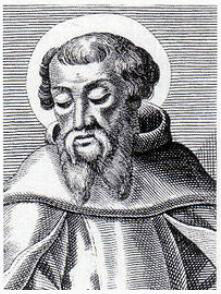Saint Irenaeus

Saint Irenaeus (c. 202CE) was Bishop of
Lugdunum in Gaul, then a part of the Roman Empire (now Lyons, France). He was an early Church Father and apologist,
and his writings were formative in the early development of Christian theology. He was a hearer of Polycarp, who in
turn was a disciple of John the Evangelist.
Irenaeus' best-known book, Adversus Haereses or Against Heresies (c. 180) is a
detailed attack on Gnosticism, which was then a serious threat to the Church, and especially on the system of the
Gnostic Valentinus. As one of the first great Christian theologians, he emphasized the traditional elements in the
Church, especially the episcopate, Scripture, and tradition. Against the Gnostics, who said that they possessed a
secret oral tradition from Jesus himself, Irenaeus maintained that the bishops in different cities are known as far
back as the Apostles—and none of them was a Gnostic—and that the bishops provided the only safe guide to the
interpretation of Scripture. Irenaeus is the earliest witness to recognition of the canonical character of all four
gospels.
The central point of Irenaeus' theology is the unity and the goodness of God, in
opposition to the Gnostics' division of God into a number of divine "Aeons", and their distinction between the
utterly transcendent "High God" and the inferior "Demiurge" who created the world. Irenaeus uses the Logos theology
he inherited from Justin Martyr (John had used Logos terminology in the Gospel of John and the letter of 1 John).
Irenaeus prefers to speak of the Son and the Spirit as the "hands of God".
His emphasis on the unity of God is reflected in his corresponding emphasis on the
unity of salvation history. Irenaeus repeatedly insists that God began the world and has been overseeing it ever
since this creative act; everything that has happened is part of his plan for humanity. The essence of this plan is
a process of maturation: Irenaeus believes that humanity was created immature, and God intended his creatures to
take a long time to grow into or assume the divine likeness. Thus, Adam and Eve were created as children. Their
Fall was thus not a full-blown rebellion but rather a childish spat, a desire to grow up before their time and have
everything with immediacy.
Everything that has happened since has therefore been planned by God to help humanity
overcome this initial mishap and achieve spiritual maturity. The world has been intentionally designed by God as a
difficult place, where human beings are forced to make moral decisions, as only in this way can they mature as
moral agents. Irenaeus likens death to the big fish that swallowed Jonah: it was only in the depths of the whale's
belly that Jonah could turn to God and act according to the divine will. Similarly, death and suffering appear as
evils, but without them we could never come to know God.
According to Irenaeus, the high point in salvation history is the advent of Jesus.
Irenaeus believed that Christ would always have been sent, even if humanity had never sinned; but the fact that
they did sin determines his role as a savior. He sees Christ as the new Adam, who systematically undoes what Adam
did: thus, where Adam was disobedient concerning God's edict concerning the fruit of the Tree of Knowledge of Good
and Evil, Christ was obedient even to death on the wood of a tree. Irenaeus is the first to draw comparisons
between Eve and Mary, contrasting the faithlessness of the former with the faithfulness of the
latter.
Irenaeus conceives of our salvation as
essentially coming about through the incarnation of God as a man. He characterizes the penalty for sin as death and
corruption. God, however, is immortal and incorruptible, and simply by becoming united to human nature in Christ he
conveys those qualities to us: they spread, as it were, like a benign infection. Irenaeus therefore understands the
atonement of Christ as happening through his incarnation rather than his crucifixion, although the latter event is
an integral part of the former.
By comparison, according to the Gnostic view of Salvation, creation was perfect to
begin with; it did not need time to grow and mature. For the Valentinians, the material world is the result of the
loss of perfection which resulted from Sophia's desire to understand the Forefather. Therefore, one is ultimately
redeemed, through secret knowledge, to enter the pleroma of which the Achamoth originally fell.
According to the Valentinian Gnostics, there are three classes of human beings. They
are 1) the material, who cannot attain salvation; 2) the psychic, who are strengthened by works and faith (they are
part of the church); and 3) the spiritual, who cannot decay or be harmed by material actions. Essentially, ordinary
humans—those who have faith but do not possess the special knowledge—will not attain salvation. Spirituals, on the
other hand—those who obtain this great gift—are the only class that will eventually attain
salvation.
z
| 